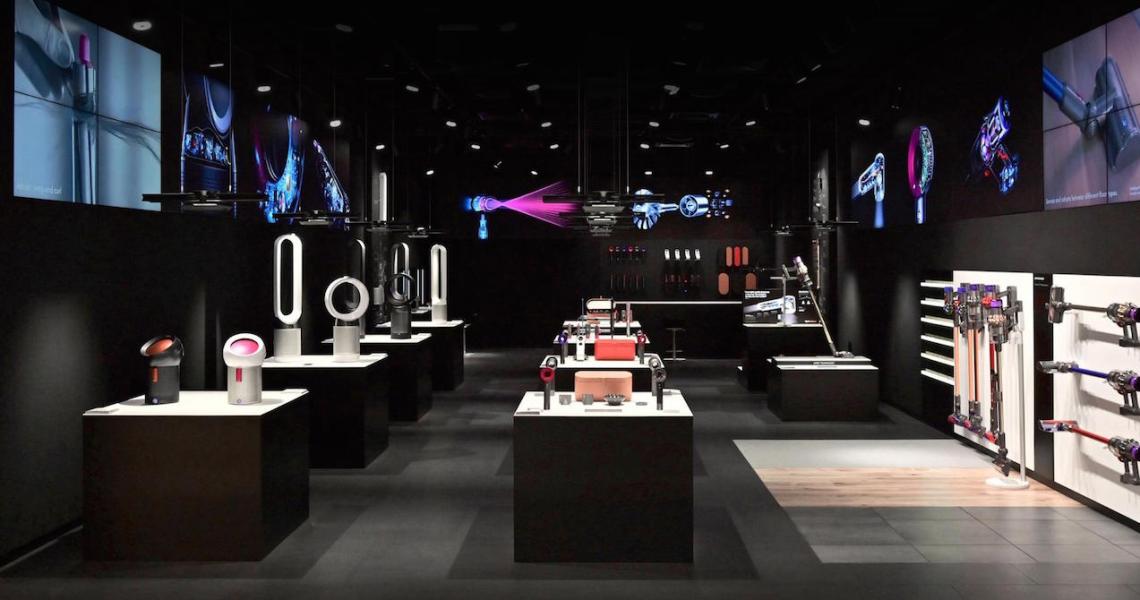While the beauty industry continues to rethink its position and bullishness on brick-and-mortar stores, Dyson is going full-steam ahead with them.
Its latest U.S. storefront, referred to as a Demo Store, opened in mid-April in Santa Clara, Calif., an affluent city nestled next to San Jose. The Demo Store features products displayed on freestanding pedestals, while technical information is communicated via videos on walls.
“California is the epicenter of health and wellness with a large and diverse population, and our products cater to a wide variety of needs,” said Peggy Elsrode, Dyson regional president for the Americas. “Westfield Valley Fair mall’s recent expansion includes a ‘digital district,’ [which is] a selection of curated direct-to-consumer, digitally native brands that speak to the Dyson ethos. [We] will be located in this newly expanded space.”
The British technology company only made its foray into beauty in 2016, with its game-changing hairdryer for $400. It has since added its Airwrap styler in 2018 for $549 and a straightener in March 2020 for $500. In Sept. 2020, it launched six additional Airwrap attachments.
The first Dyson Demo Store opened in 2000 in Paris, and there are currently 206 stores around the world with another 25 opening in 2021. In the U.S. there are stores in Los Angeles, New York City, San Francisco and Tyson’s Corner, Virg. In 2019, Dyson opened its beauty-focused Demo Store Beauty Lab in Seoul, where shoppers could experience Dyson’s latest technology with a focus on hair science.
Elsrode declined to state overall sales for the hair tool category. In July 2020, Dyson announced it would downsize by cutting 900 jobs due to Covid-19. About 600 of Dyson’s 4,000 staff in the U.K. — roughly 15% of the workforce — were cut, but only 3% of non-U.K. jobs.
But beauty is a business that still heavily relies on a brick-and-mortar presence for consumers to test and interact with products before purchasing. And Dyson faces more competitors in the hair tools space. For example, Italian brand Gama debuted its IQ Perfetto hairdryer in the U.S. in April, touting its technologically superior features compared to Dyson. And in Dec. 2020 hair tools company Chi found modest popularity on TikTok for its Spin-n-Curl rotating curler as a “Dyson dupe.” In turn, Dyson has sought to expand its branding by remolding itself into a “well-being” company.
Ad position: web_incontent_pos1
“[There is] a positive correlation to items purchased when samples are available to test in-store,” said Heather Ibberson, Edited retail analyst. “This interaction with the product first-hand is something that simply cannot be offered through e-commerce. [Additionally,] the popularity of beauty influencers has created more savvy customers who find new beauty brands on social media that they want easier accessibility to.”
During the height of global quarantine in spring 2020, Dyson added virtual tours of its flagship stores (in London, L.A, Paris and Guangzhou), as well as virtual events, curbside pick-up, shopping by appointment and online customer assistance live-chat features. It also began a social media hashtag campaign called #DysonHairAtHome across Instagram, TikTok and Twitter. In March, it partnered with Jen Atkin’s Mane Addicts website to spotlight Covid-19’s impact on hair stylists.
“Often technology was sold in large department stores, stacked high and ready to buy,” said Elsrode. “It wasn’t a tailored experience that helped potential owners understand the machines or technologies they were buying. This opportunity to get hands-on with Dyson technology will continue to underpin Dyson’s approach to retail.”




